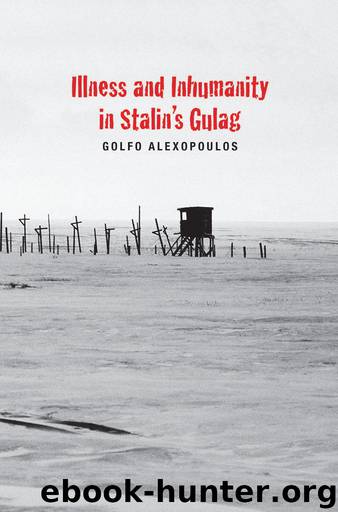Illness and Inhumanity in Stalin's Gulag by Golfo Alexopoulos

Author:Golfo Alexopoulos [Alexopoulos, Golfo]
Language: eng
Format: epub
Publisher: Yale University Press
Published: 2017-04-14T04:00:00+00:00
7. Power
“We Are Not Doctors but Delousers”
THOSE WHO WORKED within the Gulag’s medical-sanitation department, including the prisoner doctors, found themselves in what Robert Jay Lifton called “an atrocity-producing situation.” Those who worked within the institution, even the well intentioned, became associated with mass violence.1 Some diminished and dehumanized their patients, while others tried hard to improve the lives of prisoners. The principal task of the Gulag medical-sanitation department was to maximize the number of working prisoners. Health care workers operated in a highly constrained environment and were forced to serve the system of physical exploitation. The Stalinist leadership established quotas and target figures on the numbers of prisoners that had to perform the basic work (osnovnaia rabota) of the camp, be it construction, mining, or forestry. There were also quotas restricting the number of inmates who were sick, hospitalized, in recovery or convalescent camps, invalids and nonworking, and even quotas on mortality. Doctors who undermined the camp’s mandated quotas often faced punishment, which for prisoner doctors, could mean leaving the relative comfort and survivability of the clinic and returning to the deadly work of the mine. The Gulag’s medical-sanitation department had little power relative to the camps’ production managers, as their work was often limited to operating the bathhouse and containing epidemics. As a camp medical-sanitation department director lamented after the war, a certain view persisted among Gulag officials, that “we are not doctors but delousers (my ne vrachi, a vosheboiki).”2
The Gulag medical-sanitation department possessed various functions. It employed civilian and prisoner doctors, medical orderlies, and nonmedically trained staff to provide health care to prisoners in clinics, hospitals, and convalescent institutions. It maintained prisoner health records, and compiled statistics on illness and mortality. The department was tasked with reducing illnesses and preventing and containing epidemics. It conducted disinfections of persons and facilities, and ensured the regularity of prisoners’ baths. It inspected camp kitchens and cafeterias, and monitored food preparation.3 As the Gulag medical-sanitation department chief told his subordinates after the war, they had to “secure real sanitary order in the kitchens, in the cafeterias, and in other food sites.”4 But their job did not end there: “Comrades, you have enormous health care tasks before you—from eliminating lice to maintaining heat in the barracks in the winter, to obtaining clothes [for prisoners]—these and much, much more have to be in your field of vision.”5 Although the department was tasked with a great deal, it possessed little power within the camp hierarchy.
The powerlessness of Gulag’s health care workers relative to other camp authorities was put on display at an historic meeting that took place shortly after World War II. In September 1945 in the Siberian city of Novosibirsk, the directors of the medical-sanitation departments for the regional camps and colonies in the Far East, Siberia, the Urals, and Central Asia met with their boss, D.M. Loidin, the Gulag’s medical-sanitation department chief.6 By the 1940s, the NKVD-MVD-Gulag administration supervised an immense network of hundreds of labor camps and colonies. In 1944, there were
Download
This site does not store any files on its server. We only index and link to content provided by other sites. Please contact the content providers to delete copyright contents if any and email us, we'll remove relevant links or contents immediately.
| Anthropology | Archaeology |
| Philosophy | Politics & Government |
| Social Sciences | Sociology |
| Women's Studies |
The Secret History by Donna Tartt(19058)
The Social Justice Warrior Handbook by Lisa De Pasquale(12187)
Thirteen Reasons Why by Jay Asher(8894)
This Is How You Lose Her by Junot Diaz(6877)
Weapons of Math Destruction by Cathy O'Neil(6267)
Zero to One by Peter Thiel(5789)
Beartown by Fredrik Backman(5737)
The Myth of the Strong Leader by Archie Brown(5500)
The Fire Next Time by James Baldwin(5432)
How Democracies Die by Steven Levitsky & Daniel Ziblatt(5216)
Promise Me, Dad by Joe Biden(5144)
Stone's Rules by Roger Stone(5081)
A Higher Loyalty: Truth, Lies, and Leadership by James Comey(4954)
100 Deadly Skills by Clint Emerson(4921)
Rise and Kill First by Ronen Bergman(4780)
Secrecy World by Jake Bernstein(4742)
The David Icke Guide to the Global Conspiracy (and how to end it) by David Icke(4709)
The Farm by Tom Rob Smith(4502)
The Doomsday Machine by Daniel Ellsberg(4485)
